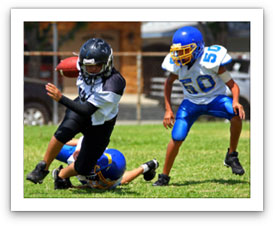Article at a Glance
• Children and teenagers should get a sports physical before starting a new sport or beginning a new competitive season, usually once each year.
• Sports physicals help identify children who are at risk for injury, illness, or sudden death while playing sports.
• The physical involves going over the child’s personal and family medical history and a physical exam that focuses on the child’s well being for playing a sport.
• Sports physicals do not take the place of a regular physical—both are important and serve different purposes.
 As the weather heats up for the summer, kids’ sports go into full swing. We recommend that kids and teens have a sports physical before starting a new sport or beginning a new competitive season.
As the weather heats up for the summer, kids’ sports go into full swing. We recommend that kids and teens have a sports physical before starting a new sport or beginning a new competitive season.
Sports physicals, also known as preparticipation physical examinations (PPE), help determine if your child is healthy enough to participate in a specific sport. They also identify children who are at risk for injury, illness, or sudden death while playing sports.
There are two main parts to a sports physical—going over your child’s medical history and performing a physical exam. We’ll go over these and help you understand the difference between sports physicals and regular physicals.
What to Expect in a Sports Physical
1. Your doctor will go over your child’s medical history The medical history is one of the most important parts of the sports physical exam. Immunizations are also reviewed to make sure they are up to date.
Your doctor will want to know your child’s medical history, including:
• Previous hospitalizations and surgeries
• Allergies
• Past injuries
• Medications taken
• Serious illnesses that run in the family, especially cardiac issues
2. Your doctor will perform a physical exam In general, the physical exam for a sports physical is the same for boys and girls, unless your child has started or already gone through puberty. The exam involves:
• Testing your child’s vision
• Recording weight and height
• Checking the heart, abdomen, lungs, ears, throat, and nose
• Taking a blood pressure and pulse reading (heart rate and rhythm)
• Asking about alcohol, drug, and dietary supplements use
If everything looks good, the doctor will sign off on the physical form. If not, a follow-up exam or more tests will be scheduled to look into any potential medical problems.
Common Questions about Sports Physicals
1. Why are sports physicals important?
Sports physicals help kids and teens understand and treat health issues that may interfere with participating in a specific sport. Your doctor may recommend specific stretches or strength training to help the child safely grow and develop in a sport.
There are often sports physical clinics held at schools or pharmacies, but we recommend that your children get a PPE with their pediatrician, as their personal doctor knows them and their history better than a doctor at a quick clinic.
2. How often should my child get a sports physical?
It’s important for children participating in athletics to get sports physicals at least once a year, but if your child is healing from a major injury (such as a broken bone), you should schedule a follow up visit to make sure your child has recovered completely. We recommend that children get their physical about six weeks before their sports season begins. That gives you enough time to follow up on any issues before the season starts.
3. Does my child need a regular physical if he or she gets a sports physical?
Sports physicals are vital because they zero in on the wellbeing required to play a sport, but regular physicals are just as essential since they focus on different aspects of your child’s health. It’s fine to do both kinds of exams in one visit, but this will require a longer appointment.
Even if your child gets the thumbs up from their doctor to participate in sports, it’s important for parents to pay attention to their kids’ health throughout the season. If you see changes in their physical condition, like shortness of breath, muscle or other pain, don’t hesitate to communicate your concerns to the coach or teacher and pediatrician.
For More Information:
Sports Physical (kidshealth.org)
American Academy of Pediatrics